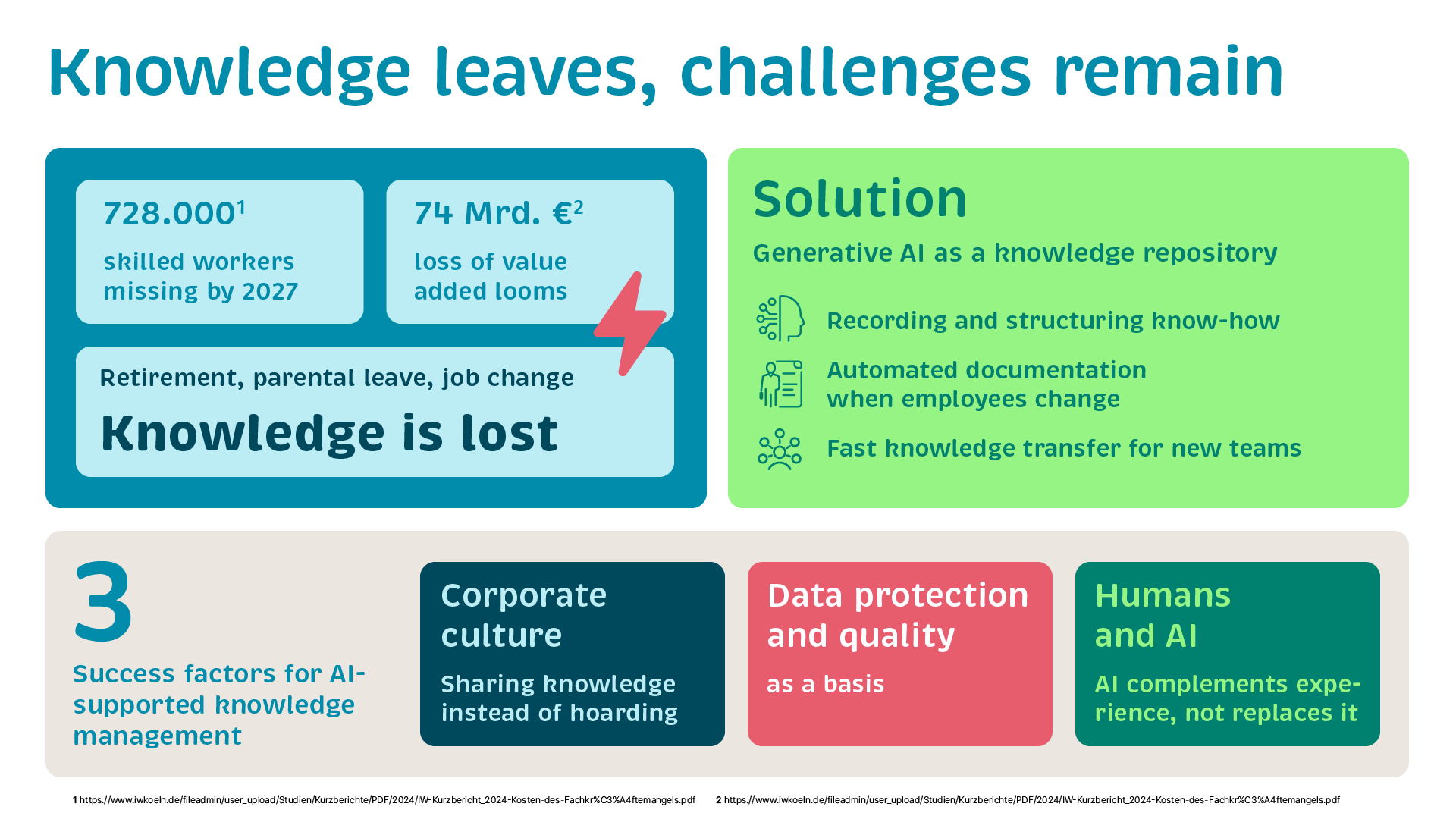Knowledge leaves, challenges remain: With each retirement, parental leave, and job change, valuable specialists leave companies-taking their knowledge with them. With them goes not only the know-how, but also some of the innovation that makes companies successful. At the same time, it is becoming increasingly difficult to find new talent. According to current forecasts, there could be a shortage of around 728,000 skilled workers in Germany by 2027, particularly in areas such as IT, engineering and healthcare (iwkoeln.de). Without targeted knowledge management, the skills shortage will be doubly exacerbated: companies will lose not only talent, but also the knowledge that makes them productive and innovative.
How can knowledge be preserved and shared? Generative Artificial Intelligence (GenAI) as part of the AI transformation provides an answer. It helps organizations capture, structure, and leverage knowledge for the future. It is crucial that companies do not use AI in isolation, but integrate it into a comprehensive strategy for securing knowledge. One example of this is Microsoft Copilot, an intelligent assistant that provides support in everyday work.
Loss of knowledge as a strategic challenge
Knowledge is one of a company's most valuable assets. But in many organizations, essential knowledge remains trapped in the heads of a small number of experts. Organizations are increasingly asking the following questions:
- How can internal knowledge be documented and used sustainably?
- What is the role of AI in knowledge transfer?
- How does knowledge management influence competitiveness?
A qualitative scientific study conducted by Anna Schätzle, Consultant Transformation of Work at Campana & Schott, as part of her doctorate at TU Darmstadt, examines the challenges and success factors for the use of AI in knowledge management.

Key findings from the study and recommendations for action
In order to better understand the use of generative AI in knowledge management, 16 interviews with experts in various fields and focus group analyses were conducted. On this basis, the following key factors were identified as fundamental to the successful integration of AI in knowledge sharing:
- Three types of knowledge are critical: companies have organizational, technical and customer knowledge. Customer knowledge is especially critical because it is often poorly documented and can be lost when employees leave.
Recommendation: Use AI-supported systems such as Microsoft Copilot to automatically capture knowledge and make it available in a structured way. - AI can structure knowledge, but it cannot capture everything: While AI helps to catalog knowledge and make it accessible, it struggles with experiential knowledge or intuitive decision-making processes that are difficult to translate into data. Organizations face the challenge of bringing together structured and unstructured knowledge in a targeted way.
Recommendation: Selectively supplement AI-based knowledge management with human expertise. - Lack of motivation to share: Many employees are reluctant to share knowledge, whether because of a lack of incentives or because they are overwhelmed by digital tools. Management plays a critical role by creating clear incentives, establishing knowledge sharing as an integral part of the culture, and leading by example.
Recommendation: Focus on change management and create incentives such as gamification or recognition systems. - AI as a support, not a replacement: AI can help document knowledge as a supporting tool, especially in the event of personnel changes such as retirement or parental leave. Proactive AI systems that automatically capture and share knowledge can make this process much easier.
Recommendation: Implement generative AI like Microsoft Copilot to capture and deliver knowledge automatically - Knowledge sharing depends heavily on the corporate culture: without clear guidelines, training and a culture of trust, AI-supported knowledge management will not be very successful. It is particularly important that the sharing of knowledge is not perceived as a risk to one's own position.
Recommendation: Promote a transparent corporate culture and define clear responsibilities for knowledge sharing. - Data quality and data protection are critical: The success of AI projects largely depends on the quality of the underlying data.
Recommendation: Ensure that your knowledge management systems meet high security standards and that your data is structured and GDPR-compliant.
Generative AI as the key to sustainable knowledge management
The success factors identified make it clear that generative AI can play a key role in making knowledge sharing more efficient and sustainable. However, the technology alone is not enough - it must be strategically integrated into existing processes. Organizations that successfully implement generative AI benefit from increased knowledge availability, reduced risk of know-how loss, and increased efficiency in knowledge transfer. The integration of AI should therefore not be seen as an isolated measure, but as part of a holistic strategy for securing knowledge. In addition to the technical implementation, targeted change management measures are required to allay fears, build trust and actively involve employees in the change.
Why should you act now?
The shortage of skilled workers is increasing. At the same time, the need to retain and share knowledge is growing. AI-powered knowledge management can help meet these challenges - provided it is strategically and sustainably integrated into existing processes.
The key is a combination of technology and people. On the one hand, companies should improve their data quality and implement proactive AI systems, such as Copilot, that can automatically capture and document knowledge. On the other hand, it is critical to actively engage employees, reduce fear, and create clear incentives for knowledge sharing.
Do you have more questions about the use of generative AI or would you like to take your knowledge management to the next level? Contact us now.
Contact
Our next events about AI:
CS Event Schweiz: M365 Copilot - Play to Win!
Microsoft 365 Copilot Event - Hamburg
Microsoft AI Tour 2025 in Köln
Microsoft AI Tour 2025 in Zürich


